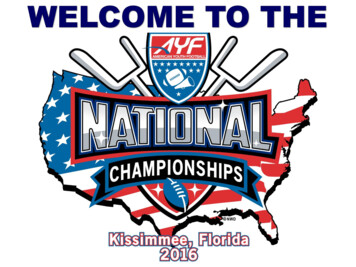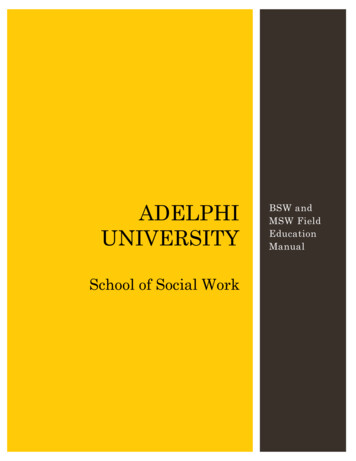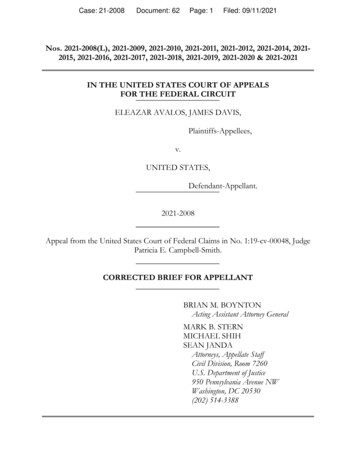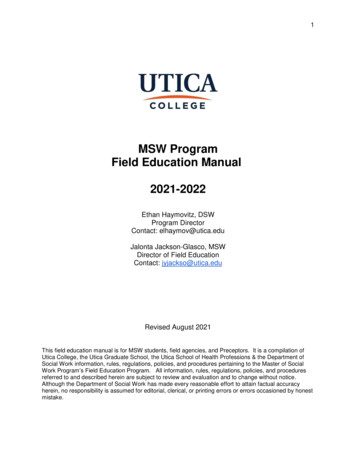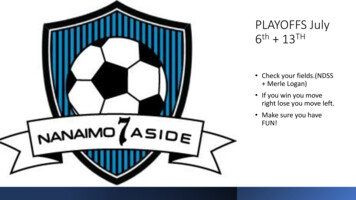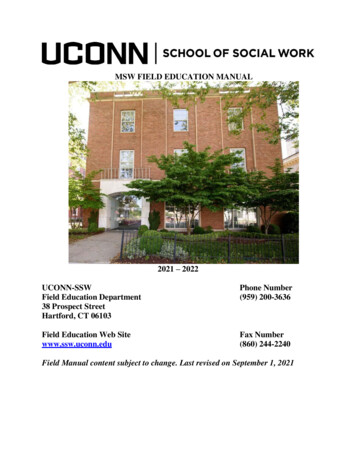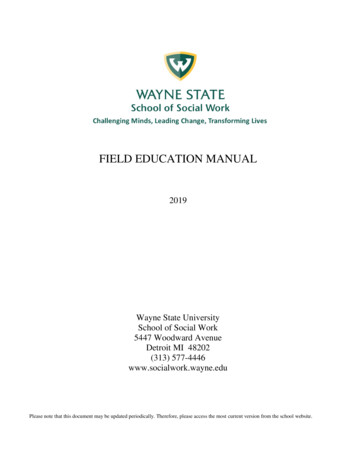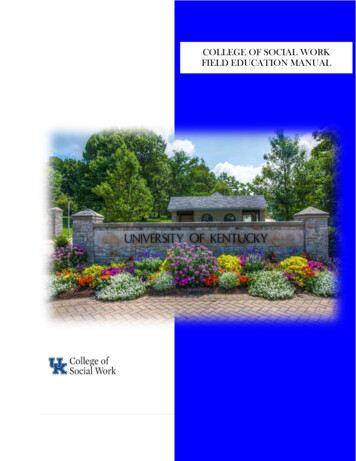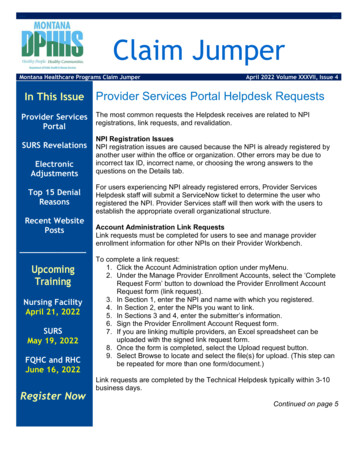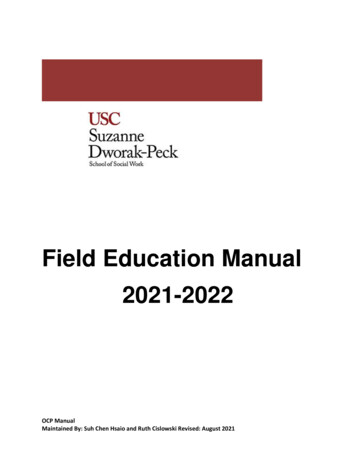
Transcription
Field Education Manual2021-2022OCP ManualMaintained By: Suh Chen Hsaio and Ruth Cislowski Revised: August 2021
2ATTENTION: The Suzanne Dworak-Peck School of Social Work fullyadheres to the School’s and the University’s policies and protocols.All MSW Students are expected to review, understand, and complywith the policies and protocols included in SCampus, USC Policies,“Current Student Website”, USC Suzanne Dworak-Peck School ofSocial Work MSW Policies and Procedures and MSW Field EducationManual.
3Table of ContentsWELCOME – Director of Field III.IV.V.FIELD EDUCATIONA. Objectives of Field EducationB. Program OverviewC. Campus LocationsD. Administration / Field Faculty / StaffE. Field Agency SitesF. Field Education RequirementsCourse WorkField InternshipEvaluation/GradingField InstructionEvidence-Based Intervention TrainingMalpractice InsuranceG. Field Education RolesH. Field Placement ProcessI. Field CalendarJ. TransportationSTUDENT / MSW CANDIDATEA. IntroductionField PlacementFirst YearSecond YearField Education & EmploymentB. Department Change ProcessC. Student Tasks & ResponsibilitiesD. SupervisionE. Safety and Risk ManagementF. Challenges and SupportG. Professional ExpectationsH. Social MediaFIELD INSTRUCTOR INFORMATIONA. IntroductionB. Field Instructor QualificationsC. Field Instructor Tasks & ResponsibilitiesD. Field InstructionE. Challenges and SupportF. Safety and Risk ManagementG. Field Internship Interruption and Strike PolicyFAILURE TO MAKE SATISFACTORY PROGRESS IN FIELDA. Level I - First Academic Warning – Student Performance Improvement PlanB. Level II – Second Academic Warning – Failure to ImproveC. Level III - Dismissal and Appeal ProcedureD. Students Terminated or Dismissed from Placement Agency or OrganizationE. Grounds for Dismissal from the MSW ProgramAPPENDIX
4WELCOMEAs the Director of Field Education, I welcome students and field instructors who areengaged in the interactive process of teaching and learning about the practice ofprofessional social work in the real world. Field Education is committed to providingopportunities for our students to develop skills in the most current practices, particularly inevidence-based interventions, and to receive supervision by the finest field instructors in thecountry.This Field Education Manual is designed to provide general information and guidanceabout Field Education and the Field Practicum to students and field instructors at both ofour Academic Centers (AC) - the On Campus Program (OCP) and the VirtualAcademic Center (VAC).Individual and specific questions are encouraged and can be directed to those fieldfaculty who are assigned to each student as Field Faculty Liaisons at each AcademicCenter. If there continues to be a concern, then the advisor/liaison can contact the AssociateDirector of Field Education for further discussion. The roles of the Director, theAssociate Director, and the Faculty are to provide our students as much support aspossible in the process of integrating theory with practice.Field Education is the “Heart of Social Work” and we want to provide an experience foreach student that represents the reality of professional social work practitioners andagencies today. The experiences in the Field Practicum can evoke a range of reactionsand like the challenges in our communities, the process of learning in the field isdynamic and complex. You may confront difficult situations and dilemmas in the firstfew months. With early and open communication and good collaborative problemsolving, the learning during the academic year will be profound and life changing,I extend my thanks and best regards to students and field instructors for beginning a lifelong journey of learning, self-discovery and transformation.Ruth Supranovich, Ed.D., LCSWDirector of Field EducationClinical Associate Professor
5I. FIELD EDUCATIONField Education is an independent and integral sequence of the MSW curriculum. Studentsare exposed to selected and organized opportunities guided by the Education Policy andEducational Standards (EPAS) and the 9 Core Competencies of the Council on Social WorkEducation (CSWE). Field is the signature pedagogy of Social Work Education. FieldEducation seeks to validate, apply, and integrate the knowledge, theories, and concepts ofsocial work practice learned throughout the curriculum. Field agencies are expected toprovide "in vivo" experiences relevant to the academic content. The student is expected toapply academic knowledge, social work skills, critical thinking, professional behavior, ethicsand values learned in the classroom to direct practice work.In order for integration of learning to occur concurrently in field sites and in the classroom,the agency and the School need to collaborate closely. USC administrators, professors andField Faculty Liaisons partner with agency field instructors to foster comprehensive andhigh-quality social work education and training. The collaboration teaches and guidesstudents to practice with cultural humility and to abide by professional social work behavior,values, and code of ethics. This culturally responsive approach helps prepare students topractice social work with diverse populations and to take on leadership roles within theprofession.A. Objectives of Field EducationField Education prepares students to enter the social work profession by meeting thefollowing objectives: Integrate academic learning with all levels of field work (micro, mezzo, macro). Increase proficiency in the required core competencies for social work education as itrelates to field work.The 2015 CSWE Social Work Competencies are as follows:1. Demonstrate Ethical and Professional Behavior2. Engage Diversity and Difference in Practice3. Advance Human Rights and Social, Economic, and Environmental Justice4. Engage in Practice-informed Research and Research-informed Practice5. Engage in Policy Practice6. Engage with Individuals, Families, Groups, Organizations, and Communities7. Assess Individuals, Families, Groups, Organizations, and Communities8. Intervene with Individuals, Families, Groups, Organizations, and Communities9. Evaluate Practice with Individuals, Families, Groups, Organizations, andCommunities Develop the ability to understand and utilize a broad range of modalities andinterventions in micro, mezzo, and macro practice with diverse populations. Focus on building the knowledge for generalist practice in the 1st semester toestablish a broad foundation for direct practice work. Develop a deeper knowledge and depth of skills needed for beginning professionalpractice in a designated Department of Study in the 2nd, 3rd, and 4th semesters.B. Program OverviewThe USC Suzanne Dworak-Peck School of Social Work is a highly ranked social workgraduate program (U.S. News and World Report) in the country. It has the largest full-timeMaster of Social Work (MSW) program in the country and it is ranked as a level one
6research school. We offer opportunities for students to select from a 4-semester, 6semester, an advanced standing or working professionals program. The traditional MSWdegree requires the completion of a minimum of 60 semester units, including four semestersof Field Internship. The first two semesters are commonly referred to as the first year of fieldstudy and the last two semesters the second-year field of study. Students must commit to aminimum of at least one eight-hour day (a maximum of 10 hours with prior faculty approval)during regular business hours (Monday-Friday, 8am-5pm) at an approved agency site.Highlights of the Program: Four-semester, six-semester, advanced standing or working professionals optionsenabling students to finish on their timetable A choice of academic centers: On Campus Program or Virtual Academic Center A choice of three Departments of Study and department specific tracks Dual degree programs A variety of department specific electives Field Internships are assigned according to students’ learning needs and educationalgoalsQuick Facts:Degree Programs Master of Social Work Master of Science in Nursing/Family Nurse Practitioner (VAC) Doctor of Philosophy Doctor of Social Work MSW to PhDDepartments of Study Adult Mental Health and Wellness (AMHW) Children, Youth and Families (CYF) Social Change and Innovation (SCI)Note that each Department of Study offers its own specific track of study (i.e. Military,Social Work in Schools, etc.) that will require completion of specific elective coursesDual Degree Programs (OCP Only) Master of Social Work/Juris Doctor Master of Social Work/Master of Business Administration Master of Social Work/Master of Science in Gerontology Master of Social Work/Master of Arts in Jewish Nonprofit Management Master of Social Work/Master of Urban Planning Master of Social Work/Master of Public Administration Master of Social Work/Master of Public Health Master of Social Work/Doctor of Philosophy
7C. Campus LocationsUniversity Park Campus (OCP)Montgomery Ross Fisher Building669 W. 34th StreetLos Angeles, CA 90089-0411213.740.2711Virtual Academic gyoverview/877.700.4MSW (4679)D. Administration / Faculty / StaffUniversity Park CampusRuth SupranovichClinical Associate ProfessorCYF DepartmentDirector of Field Educationsupranov@usc.eduSuh Chen HsiaoClinical Associate ProfessorAssociate Director, Field EducationAMHW Department213.821.0970shuhsiao@usc.eduOmar LopezClinical ProfessorDirector, Workforce Development Stipend & Scholarship ProgramsCYF Department213.821.4040omarl@usc.eduStephen HydonClinical ProfessorDirector, Social Work in Schools/PPSC ProgramsCYF Department213.740.0282hydon@usc.eduCarolina Peralta-VenturaAssociate Director of Field Education & Telehealth OperationsField Education213.740.2005carolinp@usc.edu
8OCP Support StaffLorena GarciaContracts CoordinatorField Education213.821.0971garc919@usc.eduMonica GonzalesAdministrative Assistant IField Educationgonz167@usc.eduKimberly RossAdministrative Assistant IIField Education213.740.9416kross@usc.eduOCP Field FacultyRosemary AlamoClinical Associate ProfessorCYF Department213.740.5832ralamo@usc.eduRafael AnguloClinical ProfessorCYF Department213.821.1397angulo@usc.eduMargarita ArtaviaClinical ProfessorAMHW DepartmentProfessor of Clinical Dentistry Ostrow School of Dentistry213.740.9465artavia@usc.eduJudy AxonovitzClinical ProfessorAMHW Department213.740.5726axonovit@usc.eduUmeka FranklinClinical Associate ProfessorCYF Department/Military Social Work213.821.4014ufrankli@usc.eduKim GoodmanClinical Associate ProfessorAMHW Department/GSWEC Coordinator213.740.0283kwgoodma@usc.edu
9Maria Hu HydonClinical Associate ProfessorCYF Department213.740.8920mariahu@usc.eduJenebah LewisClinical Assistant ProfessorAMHW Department213.740.1424jenebah@usc.eduPhil MeyerClinical Associate ProfessorAMHW Department213.821.1298philmeye@usc.eduRicardo OrnelasClinical Associate ProfessorSCI Department213.740.8905ricardoo@usc.eduChristina PaddockClinical Associate ProfessorCYF Department213.821.2893cpaddock@usc.eduElizabeth PhillipsClinical Associate ProfessorAMHW Department213.740.0695betsy.phillips@usc.eduHolly Priebe-SoteloClinical Associate ProfessorSCI Department213.821.6161hsotelo@usc.eduVivien VillaverdeClinical Associate Professor/Teaching Institution CoordinatorCYF Department213.821.7068villaver@usc.eduDebra Waters-RomanClinical Associate ProfessorCYF Department213-821-2961watersro@usc.eduFor information on Adjunct Field Faculty please contact sswfield@usc.eduRefer to the VAC Field Education Manual for the VAC Field Education RegionalDirectors, Faculty, and Staff Information
10TelehealthSara Caliboso-SotoClinical Assistant ProfessorClinical Director, Telehealth Clinic213.821.5942scalibos@usc.eduTelehealth Support StaffKarla GomezProgram Assistant213.821.5820karlagom@usc.eduElias MartinezAdministrative Assistant I213.821.6889em 592@usc.eduE. Field Agency SitesThe Field Practicum, also known as a student’s placement or internship, takes place in USCMemorandum of Agreement (MOA) contract approved agencies located throughout thecountry that represent a wide range of social work services and practice. These agenciesare approved sites based on the quality of the professional practice, commitment toaddressing social problems and an interest to participate in the professional education ofMSW students. The agency is responsible for providing the learning opportunitiesrepresentative of social work practice within the student’s region and/or community. Theymust subscribe to the USC Suzanne Dworak-Peck School of Social Work educationalobjectives, the CSWE EPAS and the 9 Core Competencies.Note: MSW Students are not allowed to identify nor secure their own field placement site butmay suggest potential sites for pre-approval processing.Field internship sites must treat the students as learners while providing the resourcesnecessary to meet their learning objectives. Unless officially approved by the USC SuzanneDworak-Peck School of Social Work Field Faculty and Administration, students may notwork at home during the placement hours. Hours worked at home without the expressconsent of the Field Instructor and assigned Field Faculty will not be counted as meeting thenumber of hours required for a passing grade.Note: Students cannot sign any agency “contracts” nor enter any agreements that refute ornegate the provisions in the official agency/organization MOA with the USC SuzanneDworak-Peck School of Social Work. This includes important policies regarding placementhours and educational calendar events such as finals week.There are instances when an agency may not possess the resources to provide all therequired learning experiences in one site. In such cases, a secondary placement site maybe identified and used for the purpose of meeting the student’s learning objectives andaccumulation of Field Internship hours. A large multi-disciplinary placement agency site mayalso decide to broaden the student’s experience by rotating to different departments toexpand learning opportunities. In any of these options, the primary agency site carries themain responsibility for field instruction while the secondary site provides a Preceptor for
11supplemental supervision. All options must be expressly pre-approved by the USC SuzanneDworak-Peck School of Social Work Field Faculty and Administration prior to the start of theField Internship or the hours will not be counted toward the number required for a passinggrade.The USC Suzanne Dworak-Peck School of Social Work welcomes agencies interested inpartnering as field placement sites. To qualify as a field placement site, an agency mustmeet the following criteria: Provide a sufficient amount and variety of assignments to develop student knowledgeand practice skills. Provide an opportunity to work with individuals, families, groups, communities, and/ororganizations unless otherwise indicated by specific Department of Study Coordinator. Provide ample time for weekly field instruction to permit both individual and groupconferences with students. Provide adequate office space, office supplies, telephone availability, and clericalsupport. Provide opportunities for in-service training and access to agency consultants. Have an interest in participating in the student’s research. Have an interest in aligning the agency’s practice framework to theories taught in theclassroom.New agency sites must complete the New Agency Information Packet and a Memorandumof Agreement approved by the USC Legal Counsel. An agency representative must alsomeet with a USC Field Faculty to evaluate the appropriateness of the site and for approval.This process typically takes three to six months to complete.Note: The Virtual Academic Center has specific application and approval procedures thatmust be followed. (MSW@USC)F. Field Education RequirementsApplied Learning in Field Education courses, which are the student’s Field Internship arerequired. The table below provides the sequential overview of the courses for eachsemester.Course WorkTable 1: Semester Course InformationField Education Courses (18 units total):Semester 1(3 Units) AppliedLearning in FieldEducation (589a)– 3 UnitsSemester 2(5 Units) Applied Learningin Field Education(589b) – 3 Units IntegrativeLearning forSocial WorkPractice (588) –2 UnitsSemester 3(5 Units) Advanced AppliedLearning in FieldEducation (699a)– 4 Units IntegrativeLearning forAdvanced SocialWork Practice(698a) – 1 UnitSemester 4(5 Units) Advanced AppliedLearning in FieldEducation (699b)– 4 Units IntegrativeLearning forAdvanced SocialWork Practice(698a) – 1 Unit
12All MSW students must complete two semesters of Applied Learning in Field Education(Field Internship), 589a/b and two semesters of Advanced Applied Learning in FieldEducation (Field Internship), 699a/b. All four courses must be completed sequentially aspart of the graduation requirements. All students enrolled in the second semester AppliedLearning in Field Education (589b) and Advance Applied Learning in Field Education(699a/b) courses must attend the corresponding Integrative Learning for Social WorkPractice course as indicated in Table 1. Field Education courses are assigned a “Credit” or“No Credit” grade. Applied Learning in Field Education courses are taken concurrently withthe corresponding Integrated Learning for Social Work Practice courses.Field InternshipStudents must earn between 1,000 to 1,150 Field Internship hours. All Field Internship hoursmust be earned by interning at an approved agency site assigned through the formalplacement process. The first year requires the completion of a minimum of 450 hours andthe second year requires a minimum of 550. An exception is all Pupil Personnel ServicesCredential (PPSC) students who must earn 600 hours in either one of the two years of fieldstudy. First year PPSC students must earn an additional 150 hours and second year PPSCstudents must earn an additional 50 hours. The Learning Agreement indicates the numberof hours required for each semester in Field Education. All MSW candidates regardless ofthe type of program they are enrolled in must meet the minimum 1,000 Field Internshiphours to earn their degree.The first year and second year field placements at the OCP are typically in differentagencies with an option to stay in the same agency with all the appropriate pre-approvals.The criteria and objectives vary from each Department of Study with a more generalistexperience in the first semester to a more focused experience in the remaining semesters.Field placement days vary depending on the student classes. The student will coordinatewith the agency regarding the internship schedule. Field placement days are determinedthrough a discussion between the agency and the student, with the requirement that there isat least one 8-hour day. First year and second year field placements require at least one 8hour day during regular business hours. There is no exception to this policy. Evening andweekend hours are very limited and non-existent in most communities. MSW supervisionmust be available to the student during those hours.Note: Students may not work over 8 hours per day without prior USC faculty pre-approvalnor can they work more than 32 hours per week. MSW students may not bank hours to endfield internship early nor can they credit hours from the first year to the second year of fieldinternship. Field Instructors and students must adhere to the start and end dates of fieldinternship as indicated in the Field Calendar regardless of any excess hours earned eachsemester. Below are potential exceptions to this policy: Internship extensions: Some agencies may require students to continue during thewinter and summer breaks for continuity of care. Any extension must be indicated inthe Learning Agreement. Make-up for missing hours: Any scheduled make-up hours must be completed by theadd/drop date of the following semester.
13The agency, student, and the Field Faculty Liaison must have a discussion and pre-approvethis schedule as early as possible. Any changes in internship requirements must be noted inthe Learning Agreement. Any changes in internship requirements after the initial learningagreement is completed must be made in writing and approved by the field instructor and bythe field liaison.Field Internship is assigned to all first-year internship students. First year internship studentsdo not actively participate in the matching process. They are assigned a place of internshipby the field placement team. Second year students participate in the matching process byinterviewing with agencies of interest specific to the Department of Study. Student’s refusalto participate in the field placement process and in Field Internship will delay academicprogress and may be the cause of a student’s inability to complete and graduate from theMSW program. MSW students are not allowed to identify their own field placement site butmay suggest potential sites for pre-approval processing. This process takes 3-6 months tocomplete and does not guarantee the student will be placed at the suggested field agencysite.Students are responsible for pre-placement contact with their assigned placement agencies.Pre-placement processing may take place prior to the start of the semester but should notexceed 8 hours per day nor can it exceed 32 hours per week. Although field agency sitesmay schedule pre-placement processing in the summer, they cannot be made mandatorydue to students’ travel plans or permanent home addresses. Any pre-placement agencyexpectations must be agreed upon by the student and the appropriate field faculty. If thestudent is unable to complete pre-placement requirements, the student, appropriate fieldfaculty member and agency personnel must determine how these students will be given anopportunity to make-up the pre-placement processing after semester starts.Students must make all efforts to complete agency required pre-placement processing priorto the field start date. It is the student's responsibility to make initial agency contact andcomplete all mandatory on-boarding requirements in order to begin the Field Internship ontime. Students are also responsible for transportation to and from their placement site up to30 miles in one direction from their place of residence. The School is not responsible for anytransportation related costs the student might incur (see transportation on page 18).Evaluation/GradingApplied Learning in Field Education is a 3-unit course (589a/b) in the first year and a 4-unitcourse (699a/b) in the second year of Field Internship. It is a Credit/No Credit class. Thegrading is based on meeting all the requirements: (1) completion of required hours for eachsemester, (2) timely completion of the learning agreement, (3) timely weekly completion ofthe required Reflective Learning Tools (8 per semester), and (4) achievement of the CSWESocial Work Competencies as evidenced in a satisfactory end of semester evaluation. Thestudent may complete all the hours but fail to achieve the Competencies, in which case thegrade is a “No Credit”.All four requirements must be met to pass the course and to earna “Credit” grade.Note: Any grade of “In-Progress” or “No Credit” in 598a and 699a/b requires documentationsuch as In Progress/Incomplete From and/or a Student Performance Improvement Plan(SPIP).A Learning Agreement is completed at the beginning of each internship year. Formalevaluations are also submitted at the end of each semester of internship. Field Instructors,
14students and Preceptors (if applicable) must collaborate when completing all requireddocuments. Field placements are monitored by Field Faculty Liaisons through periodicagency or virtual meetings, student-Field Instructor meetings, telephone calls, and othercontacts. Successful completion of the field internship requires meeting all the expectedhours, obtaining satisfactory formal evaluation by meeting expected growth in the CSWESocial Work Competencies and completing 8 Reflective Learning Tools turned in weeklyeach semester while enrolled in each semester of Field Internship.Field InstructionField Instruction is provided by an individual who must possess an MSW and has at leasttwo years of post MSW agency experience. They must be approved by the School of SocialWork and certified to be a Field Instructor (see Section II.B). Field Instruction takes placebetween the student and the Field Instructor in designated agency settings that have beenapproved by the Suzanne Dworak-Peck School of Social Work and the University. AnExternal Field Instructor (EFI) may be utilized if the agency does not employ an MSW butwants to host an MSW Intern. The same requirements apply to all EFI’s.There is a specific sequence of assignments, activities, and learning goals for the 1st and 2ndyear Field Internship aligned with all other courses in the School. The USC SuzanneDworak-Peck School of Social Work and the agency collaborate in assisting students tolearn and increase their mastery of the CSWE Social Work Competencies. The FieldInstruction process is intentional, active, organized, sequential, and individualized. It isconducted within the framework of a particular social work agency. Over the course of twoyears of field internship, field instruction is expected to include but not be limited to thefollowing: Direct practice work with individuals, families, and related groups Direct practice work focusing on groups, communities, organizations, and/orinstitutional change A diversity of modalities, populations, and treatments delivered in the micro, mezzo,and macro practice settings A range of theoretical and teaching methodologies and modelsEvidenced-Based Intervention TrainingAll first and second year MSW candidates are required to complete a minimum of twoEvidenced-Based Intervention trainings. Participation in these trainings counts as AppliedLearning hours.It is the student’s responsibility to communicate with and inform their Field Instructors aboutthe assigned date of their respective training if the training date requires an excused dayfrom placement. Should the Field Instructor object to the student’s absence, it is thestudent’s responsibility to connect with the Field Faculty Liaison to discuss the missedtraining.Students are offered workshops throughout the academic year and are highly encouraged toparticipate. Workshops and trainings are offered to supplement and support fieldinternships.Malpractice InsuranceAll students entering field placement are required to participate in the USC SuzanneDworak-Peck School of Social Work’s malpractice insurance coverage. Each student pays arequired malpractice insurance fee prior to placement in a field agency (included as part of
15the commitment deposit). This plan covers students while they are enrolled in their first andsecond year of field placement. Copies of the certificate can be obtained from the FieldEducation office (sswfield@usc.edu).G. Field Education RolesField education is a collaborative effort to provide a real-life social work learning experienceto students placed in a designated agency. The collaboration consists of multipleprofessionals with distinct roles. The roles within field education are as follows: Director of Field Education:The Director of Field Education is a University administrator responsible for thedevelopment and continuity of the programs and policies of Field Education. Thisindividual has overarching authority over all Field Education activities and functions,and is the direct supervisor of the Associate Director, other field administrators/directors, and all full-time Field Faculty. The Director serves as the final arbiter forissues that cannot be resolved at the Associate Director level. Associate Director of Field Education:The Associate Director of Field Education reports directly to the Director of FieldEducation. This role is responsible for the operational aspects of Field Educationactivities and is the initial arbiter of any issues pertaining to Field Education. Program Directors (Workforce Development; School Social Work; Telehealth Clinic;Operations):The Program Directors report directly to the Director of Field Education. They areresponsible for the operational aspects of the program and the initial arbiter of anyissues pertaining to it. Field Faculty Liaison:This individual is a field faculty member who coordinates, monitors, evaluates, anddocuments the student’s field experience to ensure optimal learning and professionaldevelopment. They also provide consultation, assistance and evaluation to thestudent/intern and Field Instructor. Integrated Learning Instructor/Professor:This individual is a clinical field faculty who facilitates the Integrative Learning forSocial Work Practice courses. He/she is also the student’s Field Faculty Liaison. MSW Student/Intern:The designation of “intern” is often used to refer to the MSW student when placed inan agency and enrolled in the Field Practicum and completing courses to earn aMaster of Social Work degree. Field Instructor:This individual is a professional social worker and an agency representative assignedto provide weekly supervision and instruction to MSW interns in a placement site. TheField Instructor may work collaboratively with a preceptor or daily task supervisor in anagency, but he/she has the primary and overall responsibility for the student's learning,evaluation, and linkage with the University.External Field InstructorThis individual is contracted to supervise MSW Interns and perform all the tasks of atraditional Field Instructor.Preceptor:An individual affiliated with the agency who is responsible for a piece of the student’slearning. They are supplementary instructional figure
Master of Social Work (MSW) program in the country and it is ranked as a level one . 6 . research school. We offer opportunities for students to select from a 4-semester, 6- . For information on Adjunct Field Faculty please contact sswfield@usc.edu Refer to the VAC Field Education Manual for the VAC Field Education Regional Directors, Faculty .
